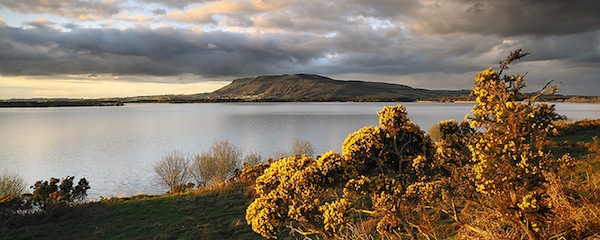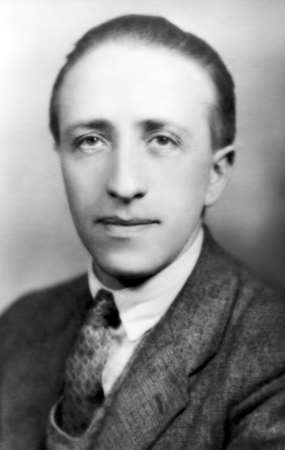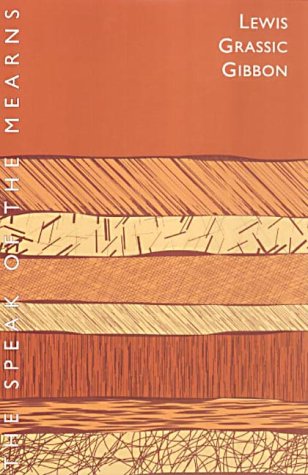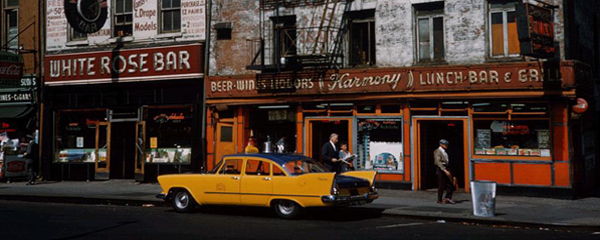
photo © SwaloPhoto (cropped), 2013
by Kenneth Steven
Lewis Grassic Gibbon almost seemed to know he would only have thirty something years in which to write. He was born into a truly agrarian world in 1901: a little bit of north-east Scotland tucked between the Grampian hills and the grey wolf of the North Sea – the Mearns.
It’s a strange corner of Scotland that’s neither Highland nor Lowland. After the spring ploughing, the fields are turned the colour of terracotta – a rich clay red that renders them some of the finest in the whole country. But when Grassic Gibbon was growing up, there were neither subsidies nor sophisticated machines for the farmers who fought this soil year after toiling year. They fought too against the months of sleet that drove down from the Grampians. When you read Grassic Gibbon’s stories, you feel that cold sore in the ends of fingers and feet, because he succeeds in putting the very smell of that soil on the page. Although he wrote most of his finest fiction in Welwyn Garden City north of London, it was in a study facing north, looking back towards the land that had given him his growing up. His stories are busy with the men and women who grew from that soil: weathered, unforgiving souls whose speech is sharp with the salt of the sea, yet who love the land they possess (and that possesses them) with the fiercest pride.
 Grassic Gibbon was a historian, a novelist, a poet. But first and always he was a writer of short stories: little globes of word swirlings that leave an echo long after they are done. I think of ‘Clay’, a story I first read when I was a boy, that lingers forever in a corner of the mind – eerie and dark and haunting.
Grassic Gibbon was a historian, a novelist, a poet. But first and always he was a writer of short stories: little globes of word swirlings that leave an echo long after they are done. I think of ‘Clay’, a story I first read when I was a boy, that lingers forever in a corner of the mind – eerie and dark and haunting.
It tells of a couple who have not long been married and who find their own first farm. It’s high on a hillside, with the curlews and lapwings calling in springtime above them. They are happy; he treats her with tenderness and, in time, there is a little girl tottering in the fields below them. They have all that they could want.
But more and more often he is out working late in those fields, unable to leave them be. He can’t stop watching them, as though trying to translate the language they are written in, struggling to work out a secret that is buried in their depths.
And then, while the dark still lay on the land, and through the low mist that slept on the fields not a bird was cheeping and not a thing showing but the waving lanterns in the Segget wynds, he’d harness his horses and lead out the first, its hooves striking fire from the stones of the close, and cry to the second, and it would come after, and the two of them drink at the trough while Rob would button up his collar against the sharp-drive of the frozen dew as the north wind woke.
His wife complains of an ache that will not leave her. Though in the end he summons the doctor, it is as though he is more concerned now with what might ail his land. Indeed, he decides he’s going to do more and break in the wild moorland that lies above the farm: rugged ground, composed of great rocks and gorse. And it’s there he unearths a grave from prehistoric times: a man curled in on himself with a sickle lying by the bones of his hands.
And Rachel looked at the hole in the clay and the chamber behind it, dim in the light, where there gleamed a rickle of stone-grey sticks, the bones of a man of antique time. Amid the bones was a litter of flints and a crumbling stick in the shape of a heuch.
It is as though this is what the farmer had been destined to find all along, as if he has discovered his own ancestor. For he knows that this man and he have been in love with the same patch of wild land, that it has been theirs and theirs alone. He only wishes he could have talked with him about the fields and all they needed; how special that would have been. Back in the farmhouse his wife is dying, not only of the cancer that has crept deeper into her breast, but of grief and loneliness.
Rachel knew it as an eirde of olden time, an earth-house built by the early folk, Rob nodded, Ay, he was more than that. Look at that heuch, it once scythed Pittaulds. Losh, lass, I’d have liked to have kenned that childe, what a crack together we’d have had on the crops!
 Grassic Gibbon writes something here that is beyond prose – it is a melding of prose and poetry that’s almost, in the end, akin to song. Not only does it capture the wind and rain, it captures the rhythm of that north-east dialect called ‘Doric’. This language of Scots is peppered with Norwegian, words that have become embedded in the tongue after long centuries of the to-ing and fro-ing of boats between the two countries.
Grassic Gibbon writes something here that is beyond prose – it is a melding of prose and poetry that’s almost, in the end, akin to song. Not only does it capture the wind and rain, it captures the rhythm of that north-east dialect called ‘Doric’. This language of Scots is peppered with Norwegian, words that have become embedded in the tongue after long centuries of the to-ing and fro-ing of boats between the two countries.
The author’s own relationship with the Mearns was always a confusion of love and hate. He knew every hummock and hillside, touched each piece of the land in his descriptions as though with an artist’s hand. But he knew also, all too well, the harshness of the life that inhabited these hard homes: the men who beat their wives, the children who went to bed hungry, and the animals ill-treated by their masters. He looks with an unflinching eye at all these corners of shadow and brings us, whether we want it or not, into the sorest and the saddest of those hidden places. So they sit together – laughter and love, sorrow and pain. In truth, he gets in his stories to the very heart of being human.
~
 Kenneth Steven is from Highland Scotland. He’s first and foremost a poet, but his fiction – both short stories and novels – have been published to some acclaim over the years. His last published novel was Glen Lyon (Birlinn), and The Well of the North Wind will appear in the spring of 2016 from SPCK in London. His short stories are available on Kindle and Smashwords.
Kenneth Steven is from Highland Scotland. He’s first and foremost a poet, but his fiction – both short stories and novels – have been published to some acclaim over the years. His last published novel was Glen Lyon (Birlinn), and The Well of the North Wind will appear in the spring of 2016 from SPCK in London. His short stories are available on Kindle and Smashwords.

